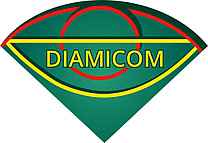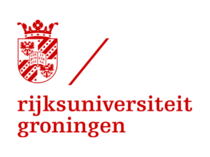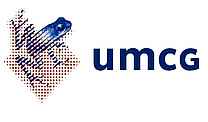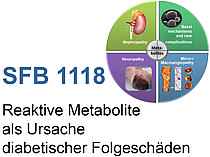Sie befinden sich hier
Inhalt
International Research Training Group 1874/2
Diabetic Microvascular Complications
The central aim of DIAMICOM is to establish a graduate school programme for the next generation of excellent scientists from both, medicine and life science, in the area of microvascular complications in diabetes. Following the aims and recommendations of DIAMAP as the roadmap towards diabetes research in Europe (see www.DIAMAP.eu), DIAMICOM addresses the most innovative basic research questions in this field. By approaching diabetes-induced changes of eye, kidney, and nerve in basic and translational projects, DIAMICOM will provide a combined platform for advanced research and education.
Mechanistic research involves hyperglycemia-driven pathogenetic pathways, relevant for target tissues of diabetic microangiopathy, the mechanisms of hyperglycaemic memory, as well as genes and factors mediating protection from target tissue damage. This scientific focus addresses hyperglycemia-driven microvascular complications relevant for both, type 1 and type 2 diabetes. The international cooperation relies on a lively joined training programme for medical and life science graduates, established in 2003 at both Universities (Heidelberg and Groningen), involving the Junior Scientific Masterclass programme and the reformed medical education programme MaReCuM, supporting the scientific education of the much needed clinical researcher.
This fully matches the recommendations of the DFG Senate Commission from 2010. The implementation of Sanofi as a partner from the pharmaceutical industry expands research expertise and education. It provides complementary excellence for both the scientific and the educational part of DIAMICOM. It offers the opportunity of a consultant for those who envision a career perspective in the R&D category of the pharmaceutical industry.
News
DIAMICOM researchers have discovered a novel mechanism for the development of insulin resistance
Metabolism of the diabetic zebrafish reveals interesting findings
Haozhe Qi, Felix Schmöhl, Xiaogang Li, Xin Qian, Christoph T. Tabler, Katrin Bennewitz, Carsten Sticht, Jakob Morgenstern, Thomas Fleming, Nadine Volk, Ingrid Hausser, Elena Heidenreich, Rüdiger Hell, Peter Paul Nawroth, Jens Kroll
Reduced Acrolein Detoxification in akr1a1a Zebra-fish Mutants Causes Impaired Insulin Receptor Signaling and Microvascular Alterations. Advanced Science, first published: 18 July 2021
press release: 210719_pm-emw_Diabetesforschung-Zebrafisch.pdf
DIAMICOM researchers have developed a novel model for the study of diabetic retinopathy in adult zebrafish
DIAMICOM researchers have generated a zebrafish mutant for the transcription factor PDX1, which shows hyperglycemia-induced structural and functional altered retinal blood vessels. For further information go to: Lucas M. Wiggenhauser, Haozhe Qi, Sandra J. Stoll, Lena Metzger, Katrin Bennewitz, Gernot Poschet, Guido Krenning, Jan-Luuk Hillebrands, Hans-Peter Hammes and Jens Kroll. Activation of retinal angiogenesis in hyperglycemic pdx1-/- zebrafish mutants. DIABETES, in press 2020.
A major discovery in diabetes research: DIAMICOM researchers show that metabolic alterations cause the development of diabetes and its complications.
Lodd E, Wiggenhauser LM, Morgenstern J, Fleming TH, Poschet G, Büttner M, Tabler CT, Wohlfart DP, Nawroth PP, Kroll J. The combination of loss of glyoxalase1 and obesity results in hyperglycemia. JCI insight, 2019.
DIAMICOM researchers have identified a novel function for the enzyme carnosinase in the metabolism.
Schmöhl F, Peters V, Schmitt CP, Poschet G, Büttner M, Li X, Weigand T, Poth T, Volk T, Morgenstern J, Fleming T, Nawroth PP, Kroll J. CNDP1 knockout in zebrafish alters the amino acid metabolism, restrains weight gain, but does not protect from diabetic complications. Cellular and Molecular Life Sciences, 2019.
Kontextspalte

DIAMICOM
IRTG 1874/2
Medical Faculty Mannheim
University Heidelberg
Theodor-Kutzer-Ufer 1-3
68167 Mannheim
Phone +49 621 383-71122
grk1874@medma.uni-heidelberg.de
Speakers
Prof. Dr. Hans-Peter Hammes
(Mannheim)
Phone +49 621 383-2663
hans-peter.hammes@medma.uni-heidelberg.de
Prof. Dr. Jens Kroll
(Mannheim)
Phone +49 621 383-71455
jens.kroll@medma.uni-heidelberg.de
Prof. Dr. Han Moshage
(Groningen)
Phone +31 50 361-2364
a.j.moshage@med.umcg.nl
Administrative Coordinator
Sigrid Englert
Phone: +49 621 383-71122
sigrid.englert@medma.uni-heidelberg.de





